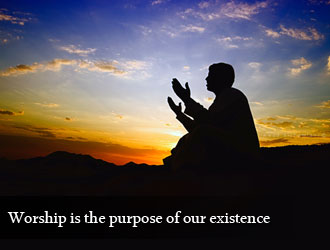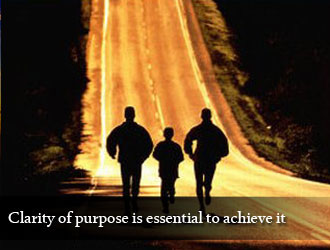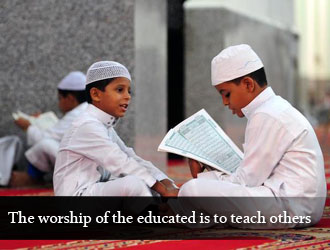- Islamic creed
- /
- Creed and Quran Miraculousness
Worship is the purpose and reason of man’s existence:
Honorable brother, we start.with the third lesson of creed and miracles
 The topic of the previous lesson was worship, the reason behind our existence, and now I will quote to you the results of a questionnaire that was run on one thousand young men to answer one question: What is the goal you are seeking? All goals mentioned were foggy, better yet only 3 percent of those youth knew their clear goals.
The topic of the previous lesson was worship, the reason behind our existence, and now I will quote to you the results of a questionnaire that was run on one thousand young men to answer one question: What is the goal you are seeking? All goals mentioned were foggy, better yet only 3 percent of those youth knew their clear goals.
When man doesn’t know the reason and the purpose of his existence, as a result his movement would be aimless, and he wouldn’t gain any security or happiness.
Hence, the first thing we should know is why are we here in this earthy life? What is the reason of our existence? And I started this topic in the previous lesson by mentioning what Allah said:
“I have only created Jinns and men, that they may serve Me.”
The ayah is clear as sun in midday, and according to radicals’ terms, it is evidence based, so worship is the reason behind our existence.
Worship has an expansive meaning and is not only about rituals:
The concept of Worship is controversial amongst Muslims. Some of them assume it is only about rituals like prayers, fasting, Haj (pilgrimage)…etc. On the other hand, there are other people who know that worship has a very wide meaning to it, and believe it or not, it involves every movement and stillness, in every word, in every giving and withholding, in every bonding and relation breaking, in every smiling and frowning, and in every contentment and rage, and wherever you go worship goes with you.
Ritual worship is not accepted unless transactional worship w is on the right path:
When you understand that worship is inseparable from you around the clock, in all your conditions and life affairs, you will worship Allah as He should be worshiped.
Hence in our previous meeting we talked about ritual and transactional worship, and the main idea was that ritual worship is not accepted unless the transactional one was on the right path, and I explained the scholars’ saying: desisting from one speck of sinful deed is better than performing 80 pilgrimages after the obligatory pilgrimage, and I mentioned that the Prophet PBUH said:
((Whoever follows the needs of his brother and takes care of them, is more rewarding than fasting for a month and staying in i’tikaf in my mosque))
So we will carry on in the topic of the expansive meaning of worship and how worship should be, and how Allah wanted it to be and that the reality of religion is to worship Allah:
“O ye people! Adore your Guardian-Lord”
Honorable brother, we have this noble ayah:
“Is then one who walks headlong, with his face grovelling, better guided, or one who walks evenly on a Straight Way?”
Whoever knows his goal clearly, will follow the right path aiming at his goal, however he who doesn’t know the reason and the purpose of his existence will go astray.
Hence, I brought an example in the previous lesson: If you were in a country with a clear goal to achieve, you would choose the means that serve that purpose. That is how a normal, rational, righteous, and successful man should be, but when you don’t know the reason of your presence in this country, your movement would be aimless and fruitless. This ayah is considered as back breaking:
achieve, you would choose the means that serve that purpose. That is how a normal, rational, righteous, and successful man should be, but when you don’t know the reason of your presence in this country, your movement would be aimless and fruitless. This ayah is considered as back breaking:
“Say: "Shall we tell you of those who lose most in respect of their deeds? Those whose efforts have been wasted in this life. While they thought that they were acquiring good by their works?”
This ayah applies to the semi-knowledgeable person, because he is not knowledgeable so he can benefit from his knowledge, nor is he ignorant so that he seeks knowledge.
For that it was said:
One might be ignorant but he is unaware of that, so consider him evil and stay away from him.
There were very delicate ideas in our last meeting regarding the ritual and transactional worship.
Transactional worship is to be honest, faithful, chaste, compassionate, humble, fair, and just.
While the ritual worship is to pray, fast, perform Haj, pay Zakat (mandatory alms-giving), and bear witness that there in no God but Allah.
Other concepts of worship:
There is another way to subdivide the concepts of worship:
First- Knowing your identity is an act of worship:
1- The worship of the rich is to spend his money righteously:
First: knowing your identity is to know who you are, and that every human has a social role to play.
Second, we have man, woman, male, and female and the question is: who is this man?
If we have a rich man, then his identity is: he is from rich kindred.
If a powerful man occupies a high position, and with his signature he can carry out rightness or remove falseness, and approve a favor or eliminate the wrongdoings, this man is considered a knowledgeable one so his identity amongst people is a missionary scholar.
Ritual worship is a common denominator amongst Muslims:
So the first thing we will talk about in this meeting - if Allah will- is who are you?
We have practices in worship considered as a common denominator amongst us, for instance we should all perform prayers (Salat) the first ritual worship and as said: there is no good in a religion without prayer the pillar of this religion, and he who performs it builds this religion and he who leaves it destroys this religion.
Prayer tops all acts which bring you to Allah, and it is the best of acts of obedience, in addition it is the believer’s ascension to the Lord of heavens and earth.
We all share performing this worship (Salat) and it is the common denominator amongst us.
We all fast, we all pay our Zakat when our money reaches the curium, and we all perform Haj when one of us is rich and capable.
Nevertheless, there are ways of worship related to your identity: Who are you?
 If you were rich, the first act of worship for you would be to spend on the poor, and you should remember that you were only bestowed that money by Allah to spend it for His sake and to gain happiness in this life and in the hereafter by spending it.
If you were rich, the first act of worship for you would be to spend on the poor, and you should remember that you were only bestowed that money by Allah to spend it for His sake and to gain happiness in this life and in the hereafter by spending it.
The evidence for that is a Hadith narrated by AbduAllah Ibn-Omar may Allah be pleased with them both, he said I heard the Prophet PBUH saying:
((There shall be no envy but (emulate) two: the person whom Allâh has given wealth and the power to spend it in the service of Truth, and the person whom Allâh has granted knowledge of things and he judges by it and teaches it (to sh3er).))
The first question: who are you?
You should ask yourself this question.
If the believer was rich he should know for sure that Allah bestowed him this money to help him in entering heaven.
Honorable brother, there are a lot of examples in life, and rich people have the potential to reach the highest ranks in heaven because the power of money is the backbone of life.
The merchant who earns his money in lawful ways and spends it on Muslims’ interests is with prophets and the sincere in Allah’s consideration, because just as I can persuade you with my ideas, I can gainyour heart with my money.
So the first act of worship for the rich is spending on the poor.
With their money they bridge the gap, bring people together, wipe tears off orphans’ faces, help youth getting married, fix homes of the poor, feed hungry people, and support orphans, so with their money they are gaining hearts.
Therefore the first act of worship is to know your identity: Who are you?
We have agreed a while ago on the common acts of worship that we share and we called them common denominators.
We all pray, fast, pay zakat, perform Haj, and bear witness, yet after performing all these common acts of ritual worship we still have the acts of worship related to man’s identity.
For the rich, spending on the poor is the first act of worship which they ought to do, because Allah bestowed on us money to be a helpful mean to obey Him, and the evidence is in this ayah:
“But seek, with the (wealth) which Allah has bestowed on thee, the Home of the Hereafter, nor forget thy portion in this World”
The ayah is very clear.
The money issue is very serious because man could slip and be a servant of the money and his soul will get infected by money the same way the body is infected with a harmful disease:
“And those saved from the covetousness of their own souls; they are the ones that achieve prosperity.”
Stinginess is a disease and the stingy person, dear brother, lives poor and dies rich, for that it was narrated in ancient books that the soul of the dead person hovers over the casket saying: Oh my family, Oh my kids, don’t let the earthy life distract you as it did to me, I collected my money lawfully and unlawfully, and I spent it in Halal ways (religiously permitted) and in Haram ways (religiously forbidden) so as a result you will enjoy my money and I will pay the price of collecting it.
The most regretful person in the hereafter is a man whose heirs enter heaven because of his money (they use it in religiously permitted ways) but he himself enters hell (because he collected and spent it in religiously forbidden ways).
So the first act of worship of the rich is spending on the poor, Allah said:
“And spend of your substance in the cause of Allah, and make not your own hands contribute to (your) destruction;”
The most delicate meanings of this ayah is: don’t contribute to your own destruction by not spending on the poor, and there are countless other examples
2- The act of worship for the powerful is to stand by the weak:
Who are you? If you are powerful and strong, then your first act of worship is to carry out rightness and be fair to the aggrieved.
You should take from the powerful and give to the weak, from the rich and give to the poor, and from the tyrant and give to the tyrannized.
You can issue an order by a mere signature, for that powerful people are pleased when they are pointed at as “VIP” (very important person), but it is knee rattling if only they knew the meaning of this word “VIP”:
“Therefore, by thy Lord, We will, of a surety, call them to account, For all their deeds.”
Hence, it was said: hold yourselves accountable before Allah Does to you.
Power is responsibility
Honorable brother, man’s social class or position could be high because of money, but that could happen by knowledge too.
The higher the class that man has, the more options he would have for good deeds.
3-The act of worship for those in charge of education:
While the teacher in the class is in charge of 30 students, the principle is in charge of 400 students, an education administrator is in charge of the whole governorate, and the minister of education is the only man in charge of the whole education curriculum, he can change the curriculum for the better, and he can assign people to write books of the highest standards, and he is able to put things in order.
The higher the position is, the more availability of wide spectrum of good deeds would be.
Hence those who are firmly established on earth are able to perform good deeds more than anyone else.
And the word “firmly established” means to be powerful, rich and knowledgeable.
The first act or worship is to be aware of your identity and to ask, who am I?
The powerful person has a better act of worship than the ritual worship, the common denominator amongst all people, as he performs that act by carrying out rightness, be fair to the aggrieved, take from the tyrant and give to the tyrannized, take from the powerful and give to the weak, and from the rich and give the poor.
He has to be fair and just, and as said: “an hour of justice equals worshiping Allah for 80 years”
So the identity is the first act of worship and for the rich is to spend on the poor.
4- A Knowledgeable person’s act of worship is to teach people:
A knowledgeable person should spread his knowledge, Allah said:
“(It is the practice of those) who preach the Messages of Allah, and fear Him, and fear none but Allah. And enough is Allah to call (men) to account.”
Look closely:
“and fear Him”
Those who preach the Messages of Allah have countless attributes, but Allah overlooked them all and mentioned only one attribute which is:
“(It is the practice of those) who preach the Messages of Allah, and fear Him, and fear none but Allah.”
If the preacher who is conveying Allah’s messages fears other than Allah and doesn’t speak out the truth because of this fear and instead he speaks out falsehood to please them, what do you think is left from his mission?
His mission is over, so there is this only all-inclusive and sufficient attribute that is to fear Allah and fear none but Allah, and not to pay attention to any blamer, all for the sake of Allah.
Dear brother, the acts of worship we’ve mentioned are: identity awareness, teaching knowledge for the sake of Allah if your were knowledgeable, carrying out rightness and condemning falseness if you were powerful, and spending on the poor for the sake of Allah if you were rich.
5- A woman’s act of worship is in serving her husband and children
 If you were a woman then your act of worship is to look after your husband and children, better yet, you and all women should know that being a good wife to your husband equals Jihad (fighting ) in Allah’s cause.
If you were a woman then your act of worship is to look after your husband and children, better yet, you and all women should know that being a good wife to your husband equals Jihad (fighting ) in Allah’s cause.
I always mention this example: a woman prayed Tahajud (after midnight prayer), shed tears in Salat (prayer), showed reverence in her heart, and melted by Allah’s love but she has five kids, and at 6 AM she got tired and asked her kids to manage their matters, of course there was no food on the table, the house was cold, some of her kids didn’t write their homework, some of them had dirty clothes on, some clothes needed mending, and they all headed to school. One of them didn’t write his homework, the second was given a notice because of his clothes, and the third had oil on his books because of the unwrapped sandwich he prepared, in general they were all insulted.
I would rather say here: If this woman woke up half an hour before sun rise and brought warmth to the room, prepared the kids’ sandwiches, helped them with their homework, looked after their clothes and back bags, and showed them to the door until they took the school bus, she would be a million times closer to Allah, because the first woman was a worshiper, while the second one worshiped Allah by carrying out her true mission.
Hence, identity is your first act of worship by knowing who you are ?
If people were aware of this fact, Muslims’ condition could have been something else, that is why our master Ali may Allah be pleased with him said:
((Four men are the backbone of religion and earthy life, a knowledgeable man who uses his knowledge, an ignorant who isn’t too arrogant to learn, a rich who doesn’t withhold his money, and a poor who doesn’t sell the hereafter for his earthy life, if the knowledgeable wasted his knowledge, the ignorant was too arrogant to learn, the rich withholds his money and the poor sold the hereafter by other’s earthy life))
Again:
((Four men are the backbone of religion and earthy life, a knowledgeable man who used his knowledge, an ignorant who isn’t too haughty to learn, a rich who doesn’t withhold his money, and a poor who doesn’t sell the hereafter for his earthy life, if the knowledgeable wasted his knowledge, the ignorant was haughty to learn, the rich withholds his money and the poor sold the hereafter earthy lifefor someone else’s earthly life
And the worst amongst people is he who sells his hereafter for another’s earthy life
Dear brother, this is the identity act of worship.
Ask yourself: Who am I? If you were rich, if you were powerful, if you were knowledgeable, and if you were a woman, each one of the above has his/her own act of worship.
You should know as a woman and all women that to be a good wife to your husband equals Jihad in Allah’s cause.
((Any woman who stayed at home to look after her children is with me in heaven, I am the first to hold the heaven’s door handle, but a woman struggles to hold it first, so I said: Gabriel, who is she? He said: she is a woman whose husband died and left her children, and she refused to marry again for their sake, and she was struggling to enter heaven before the prophet PBUH))
This is the identity act of worship, hence as a sincere devotee you should worship Allah as you were meant to.
Second- Conditions that determine the act of worship:
There is what is called conditional acts of worship, for example if someone’s father got sick, and he used to attend Islamic learning sessions, what is the priority here? Is it to stay with his father to look after him and his needs and cheer him up or leave him and neglect him and head to the other act of worship?
The answer is no! Here we have a conditional act of worship which has proiority over any other practices except for the obligatory acts (pillars.)
You are obliged to look after your father, so the first act of worship for one who has a sick father is to look after him, for one who has a visitor is to treat him with hospitality, for one who has a son about to be examined is to prepare a suitable environment for study, for one who has a daughter at the age of marriage is to find her the suitable husband, and for one who has a young son with all the temptations surrounding him is to help him getting married.
There is a delicate meaning here, and this is the second act of worship “conditional one”, so the visitor is treated with hospitality, the sick is looked after, and the student is helped studying, and there are rational fathers at the time of exams who cancel all visits and meetings and parties to set up a suitable environment for the student to study, and the whole family is on alert for the sake of that student. They are all providing a quiet house, suitable food, attention, and staying up at night. How many students failed the Baccalaureate exams because their fathers and msh3er didn’t wake them up to attend the exam, so there should be means with which parents look after the students.
visitor is treated with hospitality, the sick is looked after, and the student is helped studying, and there are rational fathers at the time of exams who cancel all visits and meetings and parties to set up a suitable environment for the student to study, and the whole family is on alert for the sake of that student. They are all providing a quiet house, suitable food, attention, and staying up at night. How many students failed the Baccalaureate exams because their fathers and msh3er didn’t wake them up to attend the exam, so there should be means with which parents look after the students.
Talking about conditional acts of worship, we should say that there are a lot of painful examples when one doesn’t know the priorities, like in case of a sick father some would perform a less rewarded worship than looking after his father, Allah won’t accept a voluntary worship which led to neglect a mandatory one.
If you have a young son surrounded with temptations of all kinds, yet every year you perform Haj (obligatory pilgrimage) and Omrah (voluntary pilgrimage) completing more than 30 Hujjah (The act of pilgrimage), you’d better help your son getting married and perform Haj once or five times at most. By doing that Allah will bless you and sh3er will benefit from you,, because your son is longing badly for a wife to chaste him.
I swear to Allah that one who helps his sons getting married nowadays, where temptation is everywhere, he would be greatly rewarded by Allah, and this doesn’t mean to neglect performing the obligatory pilgrimage, or maybe five more, but you should look after your sons too, help them get married, help them to chaste themselves, and who other than yourself do they have for that?
Listen to these words: you could be a helper for people and sh3er could be too, but your sons have nobody but you.
I swear to Allah that a man helped his two sons to have successful marriages, when they stand in front of him they are like a brigade in the army out of politeness and because of the deep love, and respect they have for him.
When a man helps his son get married it is considered a noble and great act, but other fathers lead a backward way of thinking, and say: I am a self made man and my son should be too.
I know a man, who owns more than 10 buildings, but his son was helped by a group of people who raised the money he needs to get married while his father owns more than 10 buildings, but he keeps saying I am a self-made man, and my son should manage his own matters.
I consider this a drastic harsh act.
So the usual typical father is he who looks after his kids, and I know a brave man who sold his house in the classiest neighborhood in Damascus and preferred to live in the suburb and with the money he got, he bought five houses
On the other hand I know a man owns a house worth close to 40 million and only he and his wife live in it, while their 4 sons suffer loneliness without a wife.Why not live in a house tthat is worth 10 million and buy houses for his sons with the rest?
I know very wealthy fathers who give their daughter a house when a man proposes to her and some call this way “offering” but did you do that to your daughter?
Many honest believing young men can’t afford buying a house, yet they propose to women who own houses, this is considered a blessing, and means that those fathers are wise and rational and by a house that was given to the daughter they grant her a husband and a successful marriage.
So this is what is called conditional act of worship.
Third-Time determines suitable acts of worship:
What does it mean: time is an act of worship?
fajr (dawn) / subh (morning) prayer for example, this is a time of prayer not a time of calcutions or washing cars, it is time of worship, reciting quran, praying, and dhikr (the remembrance of Allah), and it was narrated by Aisha may Allah be pleased with her, that the prophet PBUH said:
((If they only knew what they contain (Isha’a prayers as well as Fajr prayers), they would come even if they had to crawl.))
Time act of worship is to give everything what it deserves, and there are actions for Allah in the night which is not accepted to be done in the day, and there are actions for Allah in the day that are not accepted to be done in the night.
The Prophet PBUH saw a young man reciting Quran or may be worshiping during working hours so he asked him:
((Who feeds you? He answered: my brother, he said: he is better worshiper than you are))
Pay attention, this is a working time and your brother is better worshiper than you because he is earning a lawful living and spending it on his family.
There are actions for Allah in the night that are not accepted to be done in the day, and there are actions for Allah in the day that are not accepted to be done at night.
Therefore there is the third act of worship which is time worship, Fajr is a time of dhikr and salat, while the day is a time of working.
Once our master Omar saw someone who is not working in the time of work so he said:
((We were given the Quran to carry out its orders, so you are reciting it instead of working))
Forth- Worship of this era:
Eras of principles, persons and things:
Dear brother, there is an act of worship where we should come to a careful pause; it is the era act of worship.
To understand this concept we should know that eras vary.
We have an era of principles where people and things are serving the principles, and these eras are considered the most advanced amongst eras in human history.
People and things are serving the principles. Allah Almighty said:
“Say: If it be that your fathers, your sons, your brother, your mates, or your kindred;”
People
“The wealth that ye have gained; the commerce in which ye fear a decline;”
Things
“Are dearer to you than Allah, Or His Messenger, or the striving in His cause”
Principles
In principles eras as in the early Islamic era, one of Ghasasena’s kings called Jabala Ibn-AlaIham converted to Islam and was welcomed by Omar, but while he was performing tawaf (circumambulation of the Ka’ba) one of Fazara’s Bedouins stepped on his garb causing it to fall down, remember he was a king and the man who stepped on his garb was one of the common people (in contemporary’s expressions “one of the mob”) of low class, so the king hit him and broke his nose, but because this Bedouin lived in a society where principles were sacred he complained to Omar who called for that king, and a poet wrote the dialogue that took place between the two in a poem so Omar said:
Is it true what this hurt Fazari has claimed?
Jabala the king said:
I am not one of those who deny what they do I disciplined this man by my hands.
Omar said to him:
Make it up to this man, that is something you must do, your nails are still hooked to his blood
Or else he will break your nose, and you will get what your hands committed.
He said:
How so prince of believers, his is a mob and I am thrown and crown
How do you accept for a star to come down to earth?
Omar said:
Caprices of pre-Islam, and arrogance winds are buried, we built an edifice on them.
And in our eyes the slave and the free are alike.
He said:
I thought in my imagination, I am stronger and more precious,
And if you make me I will apostatize
Omar said:
We are building a world trying to mend every crack, and the most precious person is equaled with the tramp
The other kind of era is people’s era, Allah Almighty said:
“Truly Fir'aun elated himself in the land and broke up its people into sections, depressing a small group among them: their sons he slew, but he kept alive their females: for he was indeed a maker of mischief.”
And for that reason there were always prophets and powerful men, and when the era is of the powerful men they owned the necks (they subdued people with their power) but they did not gain peoples’ hearts, they took and did not give, and people lived to please them, for that people loved prophets and feared powerful men.
Principles and things are serving people in the second kind of eras “the people eras”.
Sometimes this powerful person could be powerful yet a peacemaker so it is a 50/50 chance in the era of persons that could be perfect or that it could be very destructive and painful..
But the big disaster comes in the third kind which is “things era”
A man once proposed to a girl so her father asked him: Oh son, do you have a house? He answered; of course. The father asked for the ownership paper, so he brought it to him. He asked again do you have a car, he said: yes, so he asked for the car registration, and asked again: do you have a factory, if you do bring the license. He guaranteed the house, car and a factory, so he permitted the marriage.
Then one day he paid his son in law a visit in his store and told his friends that this is my son in law, one of them snapped out and said: that is impossible!! He is not Muslim, so the father asked his son in law: you are not a Muslim? The husband said: you didn’t ask for my religion.
That is what we call “things’ era”
Nowadays man is evaluated by how big his house is, by his furniture, his vehicle, his mobile phone, and his machinery It is a disaster when things dominate, so the principles and people serve the things.
The recent time’s acts of worship:
1- Building jihad:
Let us move to another contemporary kind of worship, and this topic is very important because it concerns all Muslims.
If the enemy intended to impoverish Muslims so the best act of worship is to fix lands, build dams, dig out fortunes, develop industries, gain self sufficiency, export, and accumulate fortunes to fulfill the society needs.
 You are free as long as you are strong, and unless you excel in this earthly life, your religion won’t be respected, and unless you are strong, you won’t own your decision, this is a fact.
You are free as long as you are strong, and unless you excel in this earthly life, your religion won’t be respected, and unless you are strong, you won’t own your decision, this is a fact.
What is the proof? The answer is the Quran, pay attention to this ayah:
“Against them make ready your strength to the utmost of your power”
The word power was mentioned here in the indefinite sense, because knowledge is power, strong industry is power, and strategic industry is power.
Sometimes we allow establishing enterprises which in the most relate to tourism and services, yet we don’t have strategic industry, and as the saying goes: “A nation that eats what it does not culture, wears what it does not knit, and uses a machine it doesn’t build is doomed”
And Woe to a nation that buys its weapons, and therefore it doesn’t own its decision.
That is the contemporary act of worship, Allah The Almighty said:
“Against them make ready your strength to the utmost of your power, including steeds of war, to strike terror into (the hearts of) the enemies, of Allah and your enemies”
I am sure that the countries which own nuclear weapons will spend the next 50 years without the need of using them, because this kind of weapon is considered preventive against other countries, hence Allah said:
“Against them make ready your strength to the utmost of your power”
The word ‘power’ is in the indefinite sense which indicates the generality of the word.
Power in the days of the prophet’s era was by the horses one had, afterwards power was in catapults, later on in canons, then tanks and nowadays it is by fighting airplanes.
Remember what happened to the infrastructure in Lebanon, it cost 40 billiondollars to rebuild after it turned into wreck by airplanes’ bombing.
So unless you own an effective aerial weapon you are not powerful, therefore:
“Against them make ready your strength to the utmost of your power, including steeds of war”
This is called by scholars the conjunction of the exclusive to the general to be on alert to the nature of power.
Power is by owning advanced weapons, so if we have a plane with a range of 7 kilometers versus a tank with a range of 3 kilometers, so as a result one plane is capable of destroying 100 tanks only because of the range.
A plane is able to spot two targets 5 kilometers away while another plane is able to spot 18 targets 200 kilometers away, so the power issue is very serious.
“Against them make ready your strength to the utmost of your power”
Weapons are power, advanced weapons are power, satellites are power, information is power, high spirit is power, qualification is power, training is power, and organizing is power, Allah said:
“Against them make ready your strength to the utmost of your power”
You might not use this power but you need it as it terrifies sh3er, hence there are some preachers who fear mentioning the word “terror” in this ayah and they would say: this word makes us terrorists, well terrorism in this ayah is for the sake of not being a terrorist, so it is a terrorism to prevent terrorism so to speak:
((To strike terror into (the hearts of) the enemies, of Allah and your enemies”
A friend of mine is from an Islamic country bordering another Islamic country, the first country’s people were aggrieved, but when the second country exploded a nuclear bomb in their experiments, the rulers of the first Islamic country changed 180 degrees in their treatment to the second one, Allah said:
“To strike terror into (the hearts of) the enemies, of Allah and your enemies”
So if the other party wanted to impoverish us we should be prepared, and this is what is called the building act of worship, to build our nation, dig out fortunes, fix our lands, build dams, develop industry, and gain self sufficience, these are acts of worship.
The one and a half billion Muslims in this world have countless fortunes, one country that has the biggest preserved amount of oil in the world with 450 billions of barrels, is now occupied, Allah said:
“Against them make ready your strength to the utmost of your power, including steeds of war”
This is the first act of worship “the building Jihad”, it means bringing our work to perfection as workers, farmers, teachers, and doctors, and every man’s craft is his source of power, and his best act of religious duties is to develop and enhance it.
2- The missionary and knowledgeable Jihad:
If a party wanted to lead us astray, the first act of worship would therefore be the consolidation of the religion’s norms, by putting down doubts and controversial issues, by clearing out morals and principles, that is why missionary work is the best of Jihad, and it was said: scholars’ ink equals martyrs’ blood, as the former consolidates principles and morals, puts down doubts, and carries out righteousness and this is an act of worship too.
Therefore, worship is an act of building, “against them make ready” and we have the worship of principles’ consolidation which is a missionary worship, if you want evidence read this ayah:
“But strive against them with the utmost strenuousness, with the (Qur-an).”
Allah called teaching the holy Quran, its interpretation, and consolidation of its principles as an act of great Jihad, and this is the second act of worship nowadays.
3- Chastening youth by building activity centers:
We have a third act of worship, and if the other party wanted to spoil our youth by broadcasting 800 TV channels, including pornography, what would his target be, honor or spoil us?
Apparently it is for spoiling not honoring us, so we chasten our youth by building Islamic activity centers, schools, and universities. The best chastening act is to use Islamic alternatives.
As long as the other party wants to spoil us, we should find alternatives.
Connecting the mosque with summer resorts attracts kids and helps them to use their spare time wisely, play, and enjoy these resorts and all in all it is just to prevent spoiling our youth, so this is the third act of worship.
First: building, developing, and enrich
Second: consolidation and clearness
Third: Islamic alternatives to chasten the youth
4- Combative Jihad:
If the other party wanted to humiliate us, we should sacrifice the costly and the cheap, and the soul and the precious.
When Islamic countries were occupied by some western countries, there was a great resistance and as a result they will count to million before thinking of occupying another country again.
If the enemy wants to humiliate, people stand up against this oppressor enemy, this is worship too and it is the combative kind of Jihad, in addition to the missionary kind of Jihad Allah said:
“But strive against them with the utmost strenuousness, with the (Qur-an).”
We have the building Jihad, Allah said:
“Against them make ready your strength to the utmost of your power”
5- Self-struggling Jihad:
We also have the self-struggling Jihad, Allah said:
“And those who strive in Our (Cause), We will certainly guide them to Our Paths”
Lowering the gaze, watching the mouth, and liberating the soul all are considered self-struggling Jihad, while the building Jihad: “Against them make ready”, “but strive against them with the utmost strenuousness, with the (Qur-an).”
The combative Jihad, Allah said:
“To those against whom war is made, permission is given (to fight), because they are wronged; and verily, Allah is Most Powerful for their aid;”
They are all acts of worship.
Between missionary and combative morals:
We have the combative morals and the missionary morals, and as for the missionary morals Allah said:
“Then will he between whom and thee was hatred become as it were thy friend and intimate!”
While for the combative morals Allah said:
“O Prophet! strive hard against the Unbelievers and the Hypocrites, and be firm against them”
The difference between the two is quite clear, and the most annoying issue for some preachers is to mix between the two:
“Then will he between whom and thee was hatred become as it were thy friend and intimate!”
“And argue with them in ways that are best and most gracious”
In the combative morals Allah said:
“O Prophet!”
Dear brother, starting with the Jihad of self-struggling, missionary, building, and the combative, all are considered acts of worship most needed nowadays.
If the other party wanted to impoverish us we should enrich our countries with perfect hard work, if they wanted to lead us astray we should consolidate the religion’s norms and respond to doubts, if they wanted to spoil our youth we should chasten them, and if they wanted to humiliate us we should sacrifice the costly and cheap, and the soul and everything precious.
These are some meanings of worship dear brother, and as you see they live with man around the clock and in all his life affairs.




